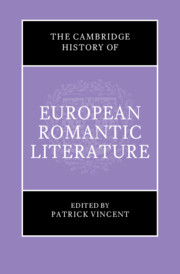Book contents
- The Cambridge History of European Romantic Literature
- The Cambridge History of European Romantic Literature
- Copyright page
- Contents
- Contributors
- Acknowledgements
- Note on the Text
- Chronology
- Introduction
- Part I Romantic Genealogies (1750–1790)
- 1 The Discovery of the Past
- 2 Discourses of Nature
- 3 The Romantic Sublime
- 4 Cultures of Sensibility
- 5 Gothic Circulations
- 6 The Crisis of Enlightenment
- Part II Revolution to Restoration (1790–1815)
- Part III Restoration to Revolution (1815–1850)
- Further Reading
- Index
6 - The Crisis of Enlightenment
from Part I - Romantic Genealogies (1750–1790)
Published online by Cambridge University Press: 10 January 2024
- The Cambridge History of European Romantic Literature
- The Cambridge History of European Romantic Literature
- Copyright page
- Contents
- Contributors
- Acknowledgements
- Note on the Text
- Chronology
- Introduction
- Part I Romantic Genealogies (1750–1790)
- 1 The Discovery of the Past
- 2 Discourses of Nature
- 3 The Romantic Sublime
- 4 Cultures of Sensibility
- 5 Gothic Circulations
- 6 The Crisis of Enlightenment
- Part II Revolution to Restoration (1790–1815)
- Part III Restoration to Revolution (1815–1850)
- Further Reading
- Index
Summary
The section’s final chapter examines the relation between philosophy, poetry, and criticism, revisiting a number of concepts introduced in previous chapters, including the development of a historical imagination and of organicist ideas of nature and culture, the new interest in aesthetics as a moral source, and the rise of sensibility as a challenge to disembodied reason. All of these contributed to a sense of crisis inherent to Enlightenment itself. It first reads the English poets Thomas Gray and Edward Young, traditionally seen as precursors of European Romanticism, alongside Kant’s First Critique to show how the philosopher sought to save reason from Hume’s scepticism by making it the product of a shared knowledge based on nature rather than book learning. the chapter then explains how the notion of ideas as historically and linguistically mediated emerged out of Vico, Rousseau, and Kant, giving particular attention to the Genevan philosopher’s social thought. The last part examines the Kant-Herder controversy, which brought to a crisis key tensions in late-Enlightenment culture between critical reason and a direct, lyrical insight into natural causality. The latter was dismissed by Kant as a dangerous form of ‘genius-cultism’ that lent itself to revolutionary fanaticism.
- Type
- Chapter
- Information
- The Cambridge History of European Romantic Literature , pp. 188 - 220Publisher: Cambridge University PressPrint publication year: 2023



